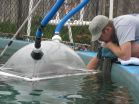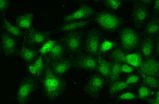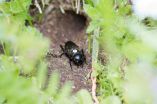Dolphins use extra energy to communicate in noisy waters
Study for first time measures biological cost to marine mammals of vocalizing in loud environments
2015-04-23
(Press-News.org) Dolphins that raise their voices to be heard in noisy environments expend extra energy in doing so, according to new research that for the first time measures the biological costs to marine mammals of trying to communicate over the sounds of ship traffic or other sources.
While dolphins expend only slightly more energy on louder whistles or other vocalizations, the metabolic cost may add up over time when the animals must compensate for chronic background noise, according to the research by scientists at NOAA Fisheries' Northwest Fisheries Science Center and the University of California Santa Cruz.
"If they're repeatedly exposed to a lot of noise, the repeated effort to call louder or longer or more often -- that's where the impacts could become more significant," said Marla Holt, a research biologist at the Northwest Fisheries Science Center in Seattle and lead author of the paper published this week in the Journal of Experimental Biology.
The impacts could be pronounced for young, growing animals or nursing females already struggling to eat enough to maintain their energy balance, the researchers concluded. Some animals also react to nearby vessels and associated noise by slapping their tails on the water or breaching - jumping clear out of the water. That could add to the extra effort required by louder calls to further drain their energy.
"You have to try to piece all these energetic costs together to analyze the increased metabolic expense that they incur when they're around different sources of disturbance," said Dawn Noren, a NWFSC research biologist who specializes in physiology of marine mammals and coauthor of the research.
The study funded by the Office of Naval Research also supports NOAA Fisheries' program to examine threats to Southern Resident Killer Whales that frequent Puget Sound. A 10-year-report on the killer whales last year identified vessel traffic and noise as one of three major risks to the whales and noted that the whales increase the volume of their calls in noisy surroundings.
The report also noted that ship noise can interfere with the echolocation the whales use to locate and hunt for food. The new findings suggest that consistently noisy surroundings could take a toll on marine mammals that rely on calls for basic life functions such as communication and foraging.
"If they are going to have to compensate for long periods, day after day, then that cumulative impact could be a concern," Noren said. "How much more fish will they need to eat to compensate for that? That is a concern for these whales because we know their food sources may be limited."
The research examined the energy expenditures of trained captive dolphins at UC Santa Cruz as stand-ins for killer whales, since the species produce sound in similar ways. The dolphins were trained to whistle softly as they might in quiet conditions and more loudly as they would in situations with greater background noise. Plastic hoods over the dolphins measured their oxygen consumption as a gauge of how much energy they expended in producing the whistles of different volumes.
The study found that the dolphins consumed about 80 percent more oxygen when whistling at the highest vocal energy levels than they did at rest. Dolphins have been found to whistle at higher repetition rates when boats are approaching, a behavior that is predicted to expended more energy based on the study's results. The results are consistent with other similar studies on birds and humans that also found similar increases in oxygen consumption associated with longer, more frequent and louder calls.
"These data would have been impossible to collect from wild animals, so without these trained dolphins we could not have conducted this study," Noren said.
INFORMATION:
[Attachments] See images for this press release:

ELSE PRESS RELEASES FROM THIS DATE:
2015-04-23
TORONTO, ON. (23 April, 2015) - A new study led by University of Toronto researcher Dr. David Lam has discovered the trigger behind the most severe forms of cancer pain. Released in top journal Pain this month, the study points to TMPRSS2 as the culprit: a gene that is also responsible for some of the most aggressive forms of androgen-fuelled cancers.
Head of Oral and Maxillofacial Surgery at the Faculty of Dentistry, Lam's research initially focused on cancers of the head and neck, which affect more than 550,000 people worldwide each year. Studies have shown that these ...
2015-04-23
ROCHESTER, Minn. -- A 47-year-old African-American woman has heavy menstrual bleeding and iron-deficiency anemia. She reports the frequent need to urinate during the night and throughout the day. A colonoscopy is negative and an ultrasonography shows a modestly enlarged uterus with three uterine fibroids, noncancerous growths of the uterus. She is not planning to become pregnant. What are her options?
Elizabeth (Ebbie) Stewart, M.D., chair of Reproductive Endocrinology at Mayo Clinic, says the woman has several options, but determining her best option is guided by her ...
2015-04-23
ANN ARBOR--Use of clean fuels and updated pollution control measures in the school buses 25 million children ride every day could result in 14 million fewer absences from school a year, based on a study by the University of Michigan and the University of Washington.
In research believed to be the first to measure the individual impact on children of the federal mandate to reduce diesel emissions, researchers found improved health and less absenteeism, especially among asthmatic children.
A change to ultra low sulfur diesel fuel reduced a marker for inflammation in ...
2015-04-23
Boosting teenagers' ability to cope with online risks, rather than trying to stop them from using the Internet, may be a more practical and effective strategy for keeping them safe, according to a team of researchers.
In a study, more resilient teens were less likely to suffer negative effects even if they were frequently online, said Haiyan Jia, post-doctoral scholar in information sciences and technology.
"Internet exposure does not necessarily lead to negative effects, which means it's okay to go online, but the key seems to be learning how to cope with the stress ...
2015-04-23
CAMBRIDGE, Mass--Drizzling honey on toast can produce mesmerizing, meandering patterns, as the syrupy fluid ripples and coils in a sticky, golden thread. Dribbling paint on canvas can produce similarly serpentine loops and waves.
The patterns created by such viscous fluids can be reproduced experimentally in a setup known as a "fluid mechanical sewing machine," in which an overhead nozzle deposits a thick fluid onto a moving conveyor belt. Researchers have carried out such experiments in an effort to identify the physical factors that influence the patterns that form. ...
2015-04-23
April 23, 2015 - Interventional treatments--especially surgery--provide good functional outcomes and a high cure rate for patients with lower-grade arteriovenous malformations (AVMs) of the brain, reports the May issue of Neurosurgery, official journal of the Congress of Neurological Surgeons. The journal is published by Wolters Kluwer.
The findings contrast with a recent trial reporting better outcomes without surgery or other interventions for AVMs. "On the basis of these data, in appropriately selected patients, we recommend treatment for low-grade brain AVMs," concludes ...
2015-04-23
A new study by the University of Chicago Booth School of Business Assistant Professor Amanda Sharkey and University of Utah Assistant Professor Patricia Bromley found that environmental ratings have spillover effects on other companies' behavior. Rated firms reduce their toxic emissions even more when their peers are also rated. In addition, rated peers can even motivate some unrated companies to reduce their emissions.
The research is unusual in that the role of peers in conditioning how firms respond to ratings systems has received little examination.
The study, "Can ...
2015-04-23
SINCE its first use in the 1980s - a breakthrough dramatised in recent ITV series Code of a Killer - DNA profiling has been a vital tool for forensic investigators. Now researchers at the University of Huddersfield have solved one of its few limitations by successfully testing a technique for distinguishing between the DNA - or genetic fingerprint - of identical twins.
The probability of a DNA match between two unrelated individuals is about one in a billion. For two full siblings, the probability drops to one-in-10,000. But identical twins present exactly the same ...
2015-04-23
This news release is available in German.
An individual's behaviour in risky situations is a distinct personality trait both in humans and animals that can have an immediate impact on longevity. Researchers from the Max Planck Institute for Ornithology in Seewiesen have now found differences in personality types for the first time in a population of free living field crickets. Risk-prone individuals showed a higher mortality as they stayed more often outside their burrow where they can be easily detected by predators, compared to risk averse individuals. Moreover, ...
2015-04-23
Navigating through a cluttered environment at high speed is among the greatest challenges in biology - and it's one virtually all birds achieve with ease.
It's a feat David Williams hopes to understand.
A former post-doctoral fellow in the lab of Andrew Biewener, the Charles P. Lyman Professor of Biology, and a current post-doc at the University of Washington, Williams is the lead author of a study that shows birds use two highly stereotyped postures to avoid obstacles in flight. The study could open the door to new ways to program drones and other unmanned aerial ...
LAST 30 PRESS RELEASES:
[Press-News.org] Dolphins use extra energy to communicate in noisy waters
Study for first time measures biological cost to marine mammals of vocalizing in loud environments



